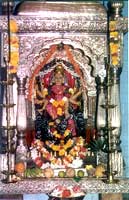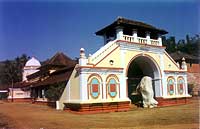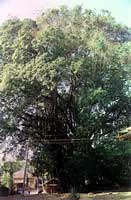Goa is dotted with numerous temples. One can find temples in
every village. Temples in GOA can be classified as:
- Sanskrit or Satwick Devtas
- Gram
- Devtas
Sanskrit or Satwick Devtas
These temples are
established by general public and have devotees called MAHAJAN all over
India. There are many such temples in Ponda Taluka. Each temple has its
own Mahajans. Some of the Mahajans make it a point to visit their temple
at least once a year. All temples are well managed and maintained from
the donations by Mahajans. Dieties are worshipped generally individually
for the welfare of their families.
Goa was
conquered by the Portuguese in two stages. 3 talukas were conquered
first. Portuguese rulers after conquering 3 talukas started destroying
Hindu temples and establishing churches in that place. Hindus therefore
shifted the temples from the original location to the new ones which
were under the control of the Hindu kings.
Shri
Vijayadurga
Shri Vijayadurga is one of the such temples located
in village Keri in the year 1560. Choice of the site of this temple
shows the great aesthetic sense of the people who selected
it.



This
temple is surrounded on all sides by evergreen hillocks, groves of
coconut, arecanut, bananas, etc. One beautiful water tank is situated
just opposite this temple. Temple is a show piece of classical
architecture, while the Deepstambha and the approach stair from temple
to water tank depict modern architecture.
Gram - Devtas
These temples were established by
original settlers in the village in order to offer prayers collectively
for the welfare of the village - hence the name Gramdevtas. They are
generally five in number and established with specific
purpose.
|
- SANTERI OR BHUMIKA
This is the
Mother Earth temple and is symbolised by ten feet or more in
height of an ant hill (Varul in local language). It is believed
that a cobra lives inside. Some villagers claim to have seen
him. There is no incident of it causing harm to any human
being.
|

|
 |
- BETAL
Betal is a seven to ten feet high wooden or
black stone statue. He is supposed to be the guardian of
the village. It is confirmed by some old villagers that
they have seen a tall figure with a long bamboo stick
moving in the village late at night.
|
 | |
|
- LAXMI NARAYAN
It is a beautifully
carved stone statue.
|
 |
 |
- GRAM - PURUSH
It is represented by a
small stone statue. No public functions take place in the
village without obtaining his blessings. |
- KSHETRA - PAL
It is symbolised by a
tree or stone and is supposed to be guarding a particular area
or kshetra. |

|